Business Law Assignment: Contractual Agreements and Disputes
VerifiedAdded on 2021/04/21
|7
|1406
|100
Homework Assignment
AI Summary
This business law assignment analyzes several contractual scenarios. The assignment explores issues of negligent misrepresentation in a contract between Richard and Shocks Are Us, where Emma misrepresented product characteristics. It also examines the doctrine of estoppel in a dispute between Richard and his landlord, George, concerning rent. Furthermore, the assignment assesses the validity of a contract between Richard and Tom regarding the sale of a 1949 Mercedes, considering offer and acceptance. Finally, it evaluates a situation involving past consideration in an agreement between Richard and Martin regarding a car rental. The analysis applies relevant Australian common law principles and case precedents to determine the legal positions of the parties involved.
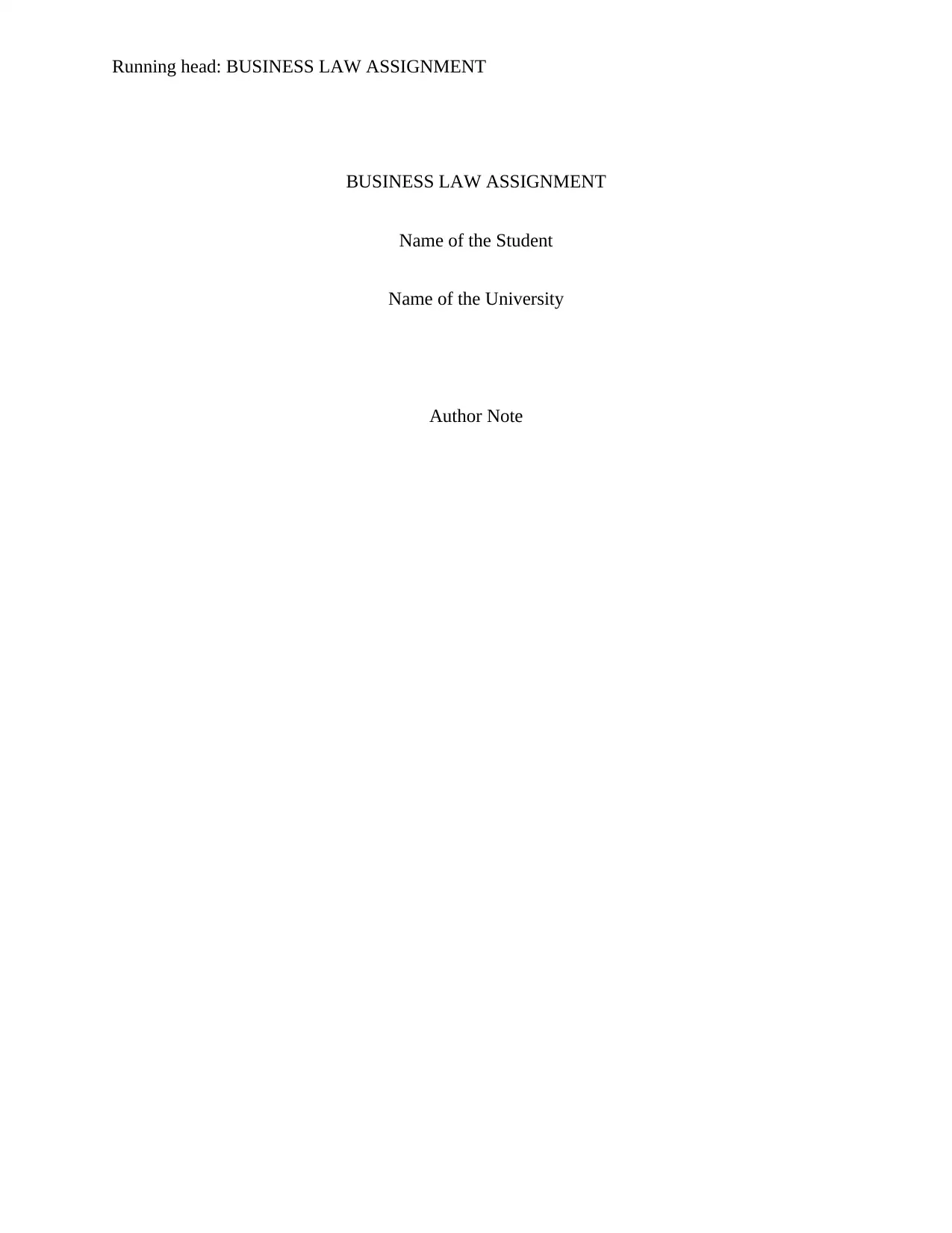
Running head: BUSINESS LAW ASSIGNMENT
BUSINESS LAW ASSIGNMENT
Name of the Student
Name of the University
Author Note
BUSINESS LAW ASSIGNMENT
Name of the Student
Name of the University
Author Note
Paraphrase This Document
Need a fresh take? Get an instant paraphrase of this document with our AI Paraphraser
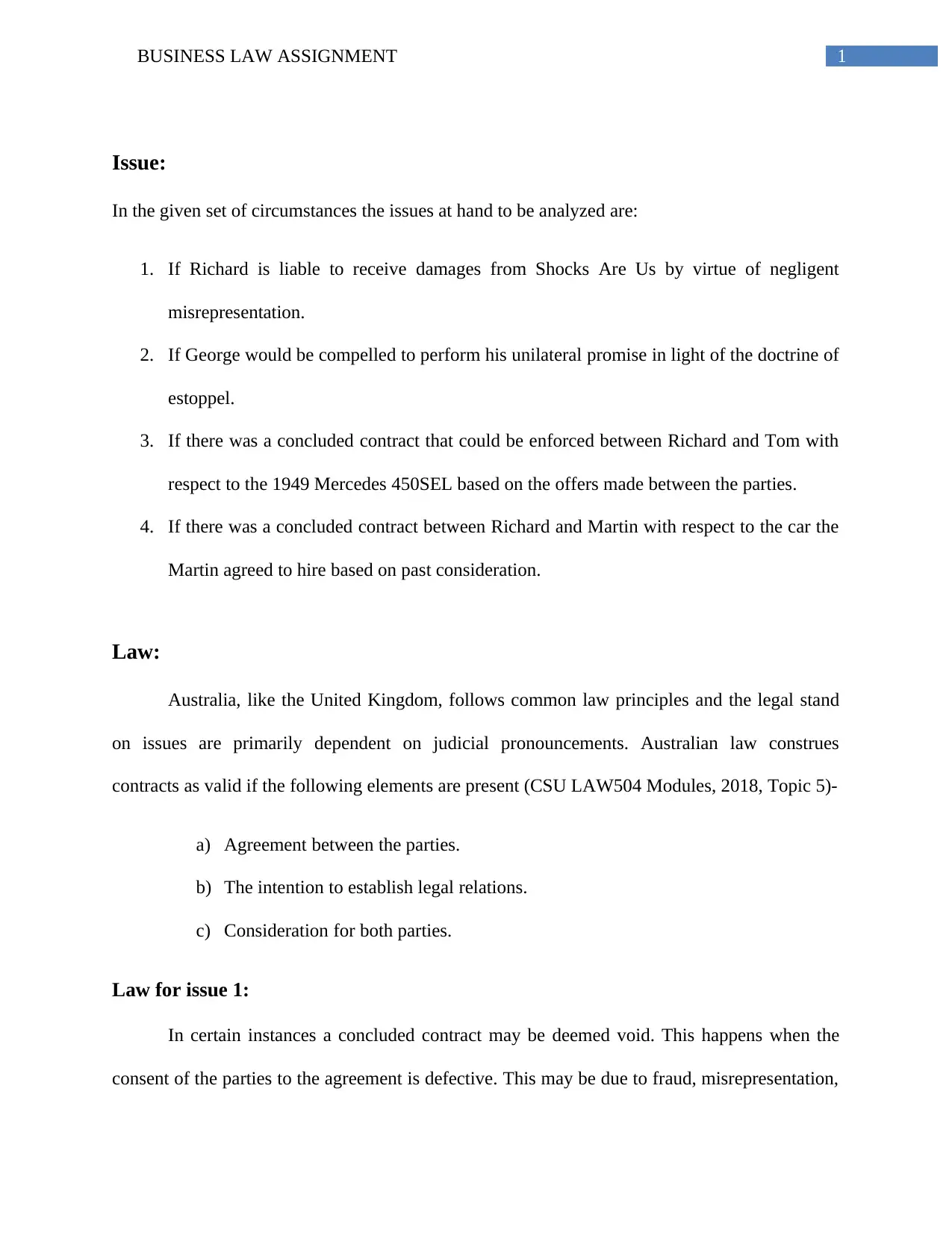
1BUSINESS LAW ASSIGNMENT
Issue:
In the given set of circumstances the issues at hand to be analyzed are:
1. If Richard is liable to receive damages from Shocks Are Us by virtue of negligent
misrepresentation.
2. If George would be compelled to perform his unilateral promise in light of the doctrine of
estoppel.
3. If there was a concluded contract that could be enforced between Richard and Tom with
respect to the 1949 Mercedes 450SEL based on the offers made between the parties.
4. If there was a concluded contract between Richard and Martin with respect to the car the
Martin agreed to hire based on past consideration.
Law:
Australia, like the United Kingdom, follows common law principles and the legal stand
on issues are primarily dependent on judicial pronouncements. Australian law construes
contracts as valid if the following elements are present (CSU LAW504 Modules, 2018, Topic 5)-
a) Agreement between the parties.
b) The intention to establish legal relations.
c) Consideration for both parties.
Law for issue 1:
In certain instances a concluded contract may be deemed void. This happens when the
consent of the parties to the agreement is defective. This may be due to fraud, misrepresentation,
Issue:
In the given set of circumstances the issues at hand to be analyzed are:
1. If Richard is liable to receive damages from Shocks Are Us by virtue of negligent
misrepresentation.
2. If George would be compelled to perform his unilateral promise in light of the doctrine of
estoppel.
3. If there was a concluded contract that could be enforced between Richard and Tom with
respect to the 1949 Mercedes 450SEL based on the offers made between the parties.
4. If there was a concluded contract between Richard and Martin with respect to the car the
Martin agreed to hire based on past consideration.
Law:
Australia, like the United Kingdom, follows common law principles and the legal stand
on issues are primarily dependent on judicial pronouncements. Australian law construes
contracts as valid if the following elements are present (CSU LAW504 Modules, 2018, Topic 5)-
a) Agreement between the parties.
b) The intention to establish legal relations.
c) Consideration for both parties.
Law for issue 1:
In certain instances a concluded contract may be deemed void. This happens when the
consent of the parties to the agreement is defective. This may be due to fraud, misrepresentation,
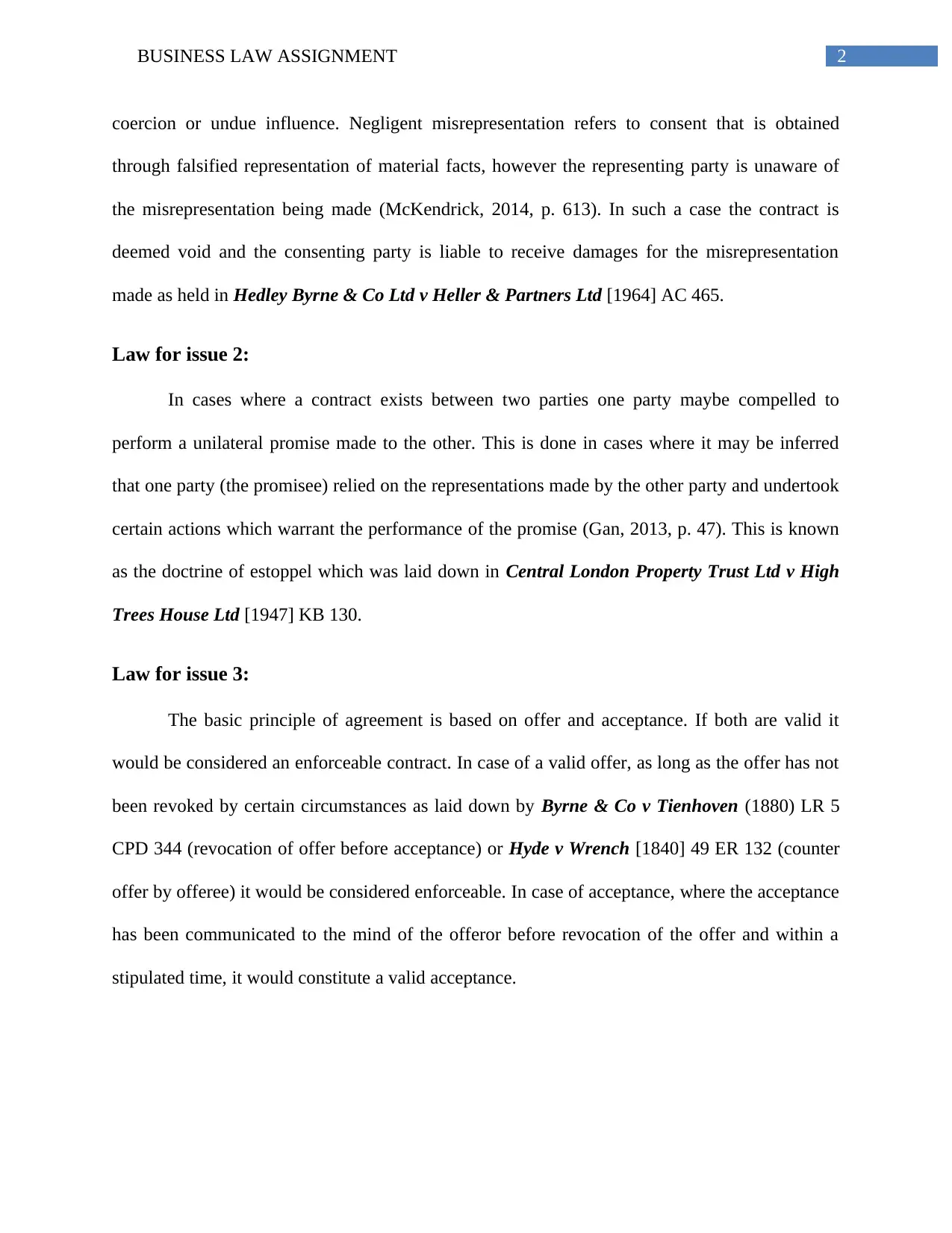
2BUSINESS LAW ASSIGNMENT
coercion or undue influence. Negligent misrepresentation refers to consent that is obtained
through falsified representation of material facts, however the representing party is unaware of
the misrepresentation being made (McKendrick, 2014, p. 613). In such a case the contract is
deemed void and the consenting party is liable to receive damages for the misrepresentation
made as held in Hedley Byrne & Co Ltd v Heller & Partners Ltd [1964] AC 465.
Law for issue 2:
In cases where a contract exists between two parties one party maybe compelled to
perform a unilateral promise made to the other. This is done in cases where it may be inferred
that one party (the promisee) relied on the representations made by the other party and undertook
certain actions which warrant the performance of the promise (Gan, 2013, p. 47). This is known
as the doctrine of estoppel which was laid down in Central London Property Trust Ltd v High
Trees House Ltd [1947] KB 130.
Law for issue 3:
The basic principle of agreement is based on offer and acceptance. If both are valid it
would be considered an enforceable contract. In case of a valid offer, as long as the offer has not
been revoked by certain circumstances as laid down by Byrne & Co v Tienhoven (1880) LR 5
CPD 344 (revocation of offer before acceptance) or Hyde v Wrench [1840] 49 ER 132 (counter
offer by offeree) it would be considered enforceable. In case of acceptance, where the acceptance
has been communicated to the mind of the offeror before revocation of the offer and within a
stipulated time, it would constitute a valid acceptance.
coercion or undue influence. Negligent misrepresentation refers to consent that is obtained
through falsified representation of material facts, however the representing party is unaware of
the misrepresentation being made (McKendrick, 2014, p. 613). In such a case the contract is
deemed void and the consenting party is liable to receive damages for the misrepresentation
made as held in Hedley Byrne & Co Ltd v Heller & Partners Ltd [1964] AC 465.
Law for issue 2:
In cases where a contract exists between two parties one party maybe compelled to
perform a unilateral promise made to the other. This is done in cases where it may be inferred
that one party (the promisee) relied on the representations made by the other party and undertook
certain actions which warrant the performance of the promise (Gan, 2013, p. 47). This is known
as the doctrine of estoppel which was laid down in Central London Property Trust Ltd v High
Trees House Ltd [1947] KB 130.
Law for issue 3:
The basic principle of agreement is based on offer and acceptance. If both are valid it
would be considered an enforceable contract. In case of a valid offer, as long as the offer has not
been revoked by certain circumstances as laid down by Byrne & Co v Tienhoven (1880) LR 5
CPD 344 (revocation of offer before acceptance) or Hyde v Wrench [1840] 49 ER 132 (counter
offer by offeree) it would be considered enforceable. In case of acceptance, where the acceptance
has been communicated to the mind of the offeror before revocation of the offer and within a
stipulated time, it would constitute a valid acceptance.
⊘ This is a preview!⊘
Do you want full access?
Subscribe today to unlock all pages.

Trusted by 1+ million students worldwide
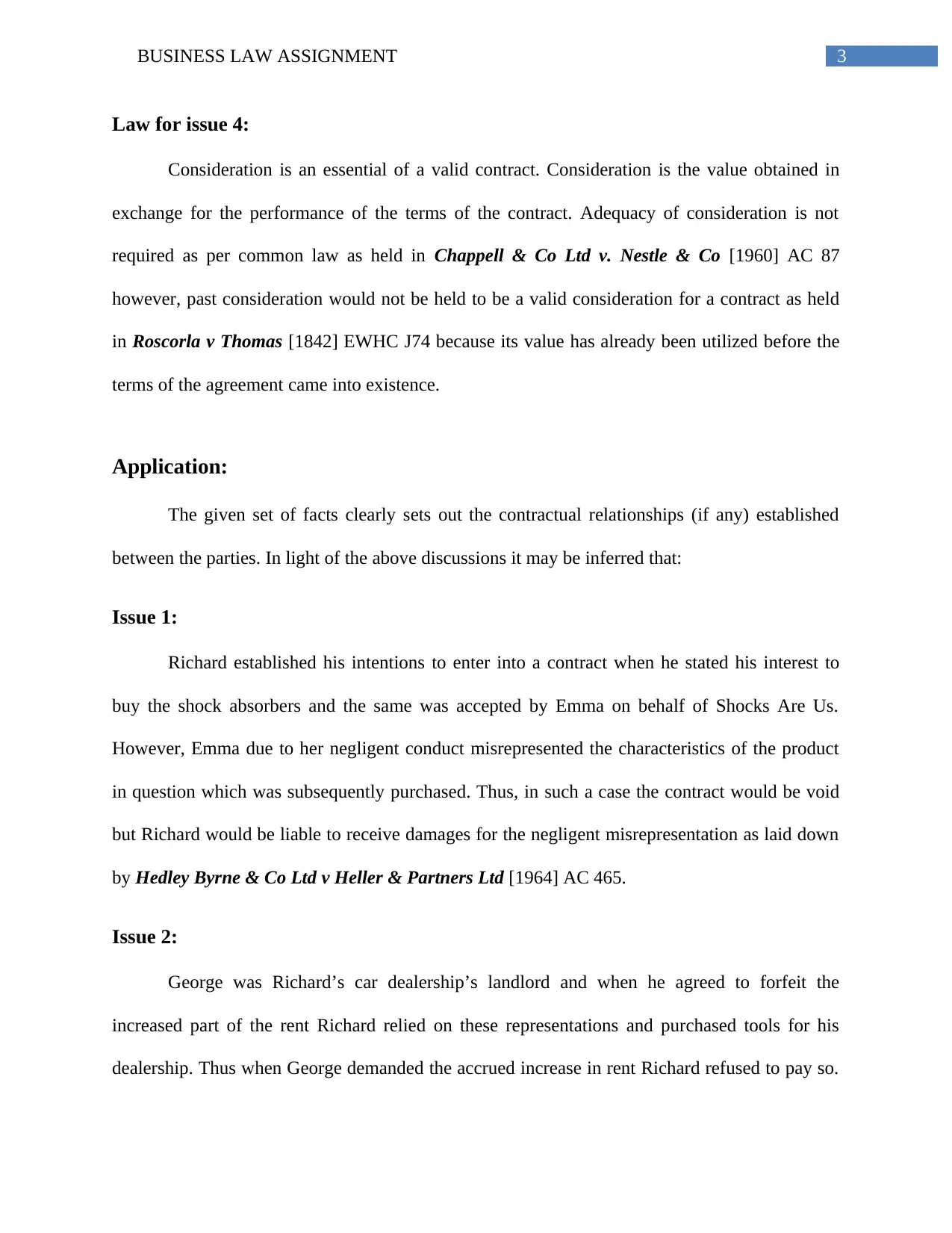
3BUSINESS LAW ASSIGNMENT
Law for issue 4:
Consideration is an essential of a valid contract. Consideration is the value obtained in
exchange for the performance of the terms of the contract. Adequacy of consideration is not
required as per common law as held in Chappell & Co Ltd v. Nestle & Co [1960] AC 87
however, past consideration would not be held to be a valid consideration for a contract as held
in Roscorla v Thomas [1842] EWHC J74 because its value has already been utilized before the
terms of the agreement came into existence.
Application:
The given set of facts clearly sets out the contractual relationships (if any) established
between the parties. In light of the above discussions it may be inferred that:
Issue 1:
Richard established his intentions to enter into a contract when he stated his interest to
buy the shock absorbers and the same was accepted by Emma on behalf of Shocks Are Us.
However, Emma due to her negligent conduct misrepresented the characteristics of the product
in question which was subsequently purchased. Thus, in such a case the contract would be void
but Richard would be liable to receive damages for the negligent misrepresentation as laid down
by Hedley Byrne & Co Ltd v Heller & Partners Ltd [1964] AC 465.
Issue 2:
George was Richard’s car dealership’s landlord and when he agreed to forfeit the
increased part of the rent Richard relied on these representations and purchased tools for his
dealership. Thus when George demanded the accrued increase in rent Richard refused to pay so.
Law for issue 4:
Consideration is an essential of a valid contract. Consideration is the value obtained in
exchange for the performance of the terms of the contract. Adequacy of consideration is not
required as per common law as held in Chappell & Co Ltd v. Nestle & Co [1960] AC 87
however, past consideration would not be held to be a valid consideration for a contract as held
in Roscorla v Thomas [1842] EWHC J74 because its value has already been utilized before the
terms of the agreement came into existence.
Application:
The given set of facts clearly sets out the contractual relationships (if any) established
between the parties. In light of the above discussions it may be inferred that:
Issue 1:
Richard established his intentions to enter into a contract when he stated his interest to
buy the shock absorbers and the same was accepted by Emma on behalf of Shocks Are Us.
However, Emma due to her negligent conduct misrepresented the characteristics of the product
in question which was subsequently purchased. Thus, in such a case the contract would be void
but Richard would be liable to receive damages for the negligent misrepresentation as laid down
by Hedley Byrne & Co Ltd v Heller & Partners Ltd [1964] AC 465.
Issue 2:
George was Richard’s car dealership’s landlord and when he agreed to forfeit the
increased part of the rent Richard relied on these representations and purchased tools for his
dealership. Thus when George demanded the accrued increase in rent Richard refused to pay so.
Paraphrase This Document
Need a fresh take? Get an instant paraphrase of this document with our AI Paraphraser
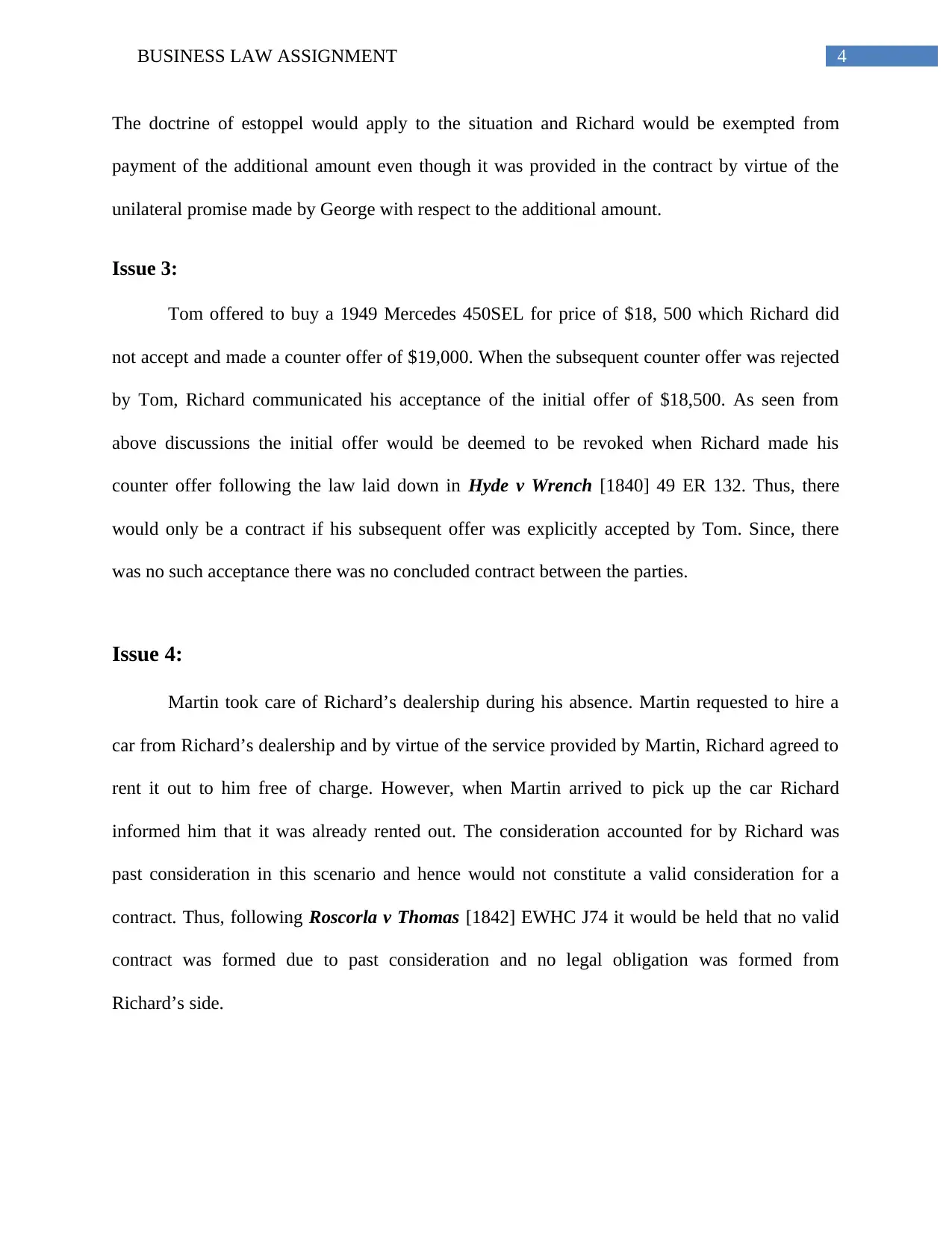
4BUSINESS LAW ASSIGNMENT
The doctrine of estoppel would apply to the situation and Richard would be exempted from
payment of the additional amount even though it was provided in the contract by virtue of the
unilateral promise made by George with respect to the additional amount.
Issue 3:
Tom offered to buy a 1949 Mercedes 450SEL for price of $18, 500 which Richard did
not accept and made a counter offer of $19,000. When the subsequent counter offer was rejected
by Tom, Richard communicated his acceptance of the initial offer of $18,500. As seen from
above discussions the initial offer would be deemed to be revoked when Richard made his
counter offer following the law laid down in Hyde v Wrench [1840] 49 ER 132. Thus, there
would only be a contract if his subsequent offer was explicitly accepted by Tom. Since, there
was no such acceptance there was no concluded contract between the parties.
Issue 4:
Martin took care of Richard’s dealership during his absence. Martin requested to hire a
car from Richard’s dealership and by virtue of the service provided by Martin, Richard agreed to
rent it out to him free of charge. However, when Martin arrived to pick up the car Richard
informed him that it was already rented out. The consideration accounted for by Richard was
past consideration in this scenario and hence would not constitute a valid consideration for a
contract. Thus, following Roscorla v Thomas [1842] EWHC J74 it would be held that no valid
contract was formed due to past consideration and no legal obligation was formed from
Richard’s side.
The doctrine of estoppel would apply to the situation and Richard would be exempted from
payment of the additional amount even though it was provided in the contract by virtue of the
unilateral promise made by George with respect to the additional amount.
Issue 3:
Tom offered to buy a 1949 Mercedes 450SEL for price of $18, 500 which Richard did
not accept and made a counter offer of $19,000. When the subsequent counter offer was rejected
by Tom, Richard communicated his acceptance of the initial offer of $18,500. As seen from
above discussions the initial offer would be deemed to be revoked when Richard made his
counter offer following the law laid down in Hyde v Wrench [1840] 49 ER 132. Thus, there
would only be a contract if his subsequent offer was explicitly accepted by Tom. Since, there
was no such acceptance there was no concluded contract between the parties.
Issue 4:
Martin took care of Richard’s dealership during his absence. Martin requested to hire a
car from Richard’s dealership and by virtue of the service provided by Martin, Richard agreed to
rent it out to him free of charge. However, when Martin arrived to pick up the car Richard
informed him that it was already rented out. The consideration accounted for by Richard was
past consideration in this scenario and hence would not constitute a valid consideration for a
contract. Thus, following Roscorla v Thomas [1842] EWHC J74 it would be held that no valid
contract was formed due to past consideration and no legal obligation was formed from
Richard’s side.
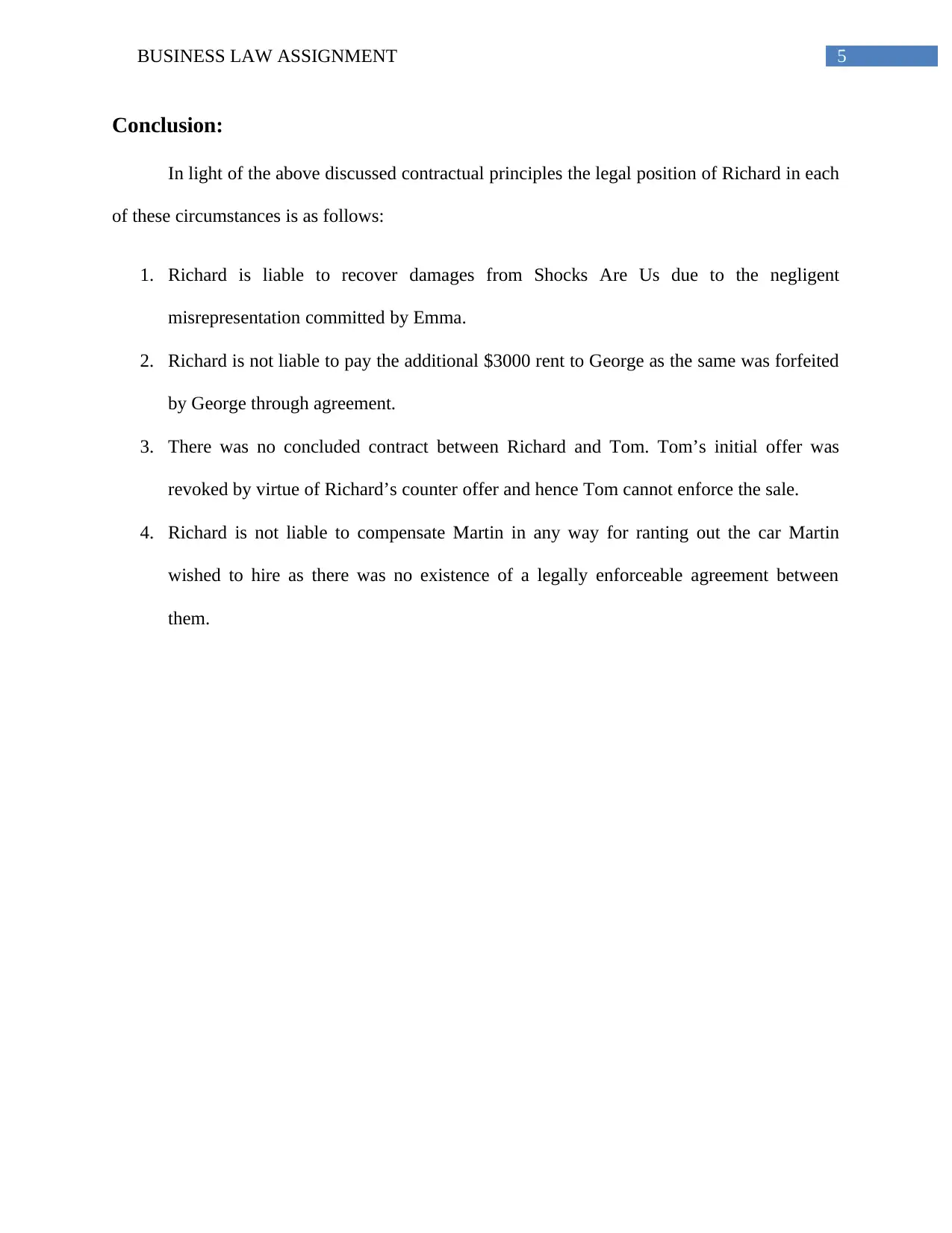
5BUSINESS LAW ASSIGNMENT
Conclusion:
In light of the above discussed contractual principles the legal position of Richard in each
of these circumstances is as follows:
1. Richard is liable to recover damages from Shocks Are Us due to the negligent
misrepresentation committed by Emma.
2. Richard is not liable to pay the additional $3000 rent to George as the same was forfeited
by George through agreement.
3. There was no concluded contract between Richard and Tom. Tom’s initial offer was
revoked by virtue of Richard’s counter offer and hence Tom cannot enforce the sale.
4. Richard is not liable to compensate Martin in any way for ranting out the car Martin
wished to hire as there was no existence of a legally enforceable agreement between
them.
Conclusion:
In light of the above discussed contractual principles the legal position of Richard in each
of these circumstances is as follows:
1. Richard is liable to recover damages from Shocks Are Us due to the negligent
misrepresentation committed by Emma.
2. Richard is not liable to pay the additional $3000 rent to George as the same was forfeited
by George through agreement.
3. There was no concluded contract between Richard and Tom. Tom’s initial offer was
revoked by virtue of Richard’s counter offer and hence Tom cannot enforce the sale.
4. Richard is not liable to compensate Martin in any way for ranting out the car Martin
wished to hire as there was no existence of a legally enforceable agreement between
them.
⊘ This is a preview!⊘
Do you want full access?
Subscribe today to unlock all pages.

Trusted by 1+ million students worldwide
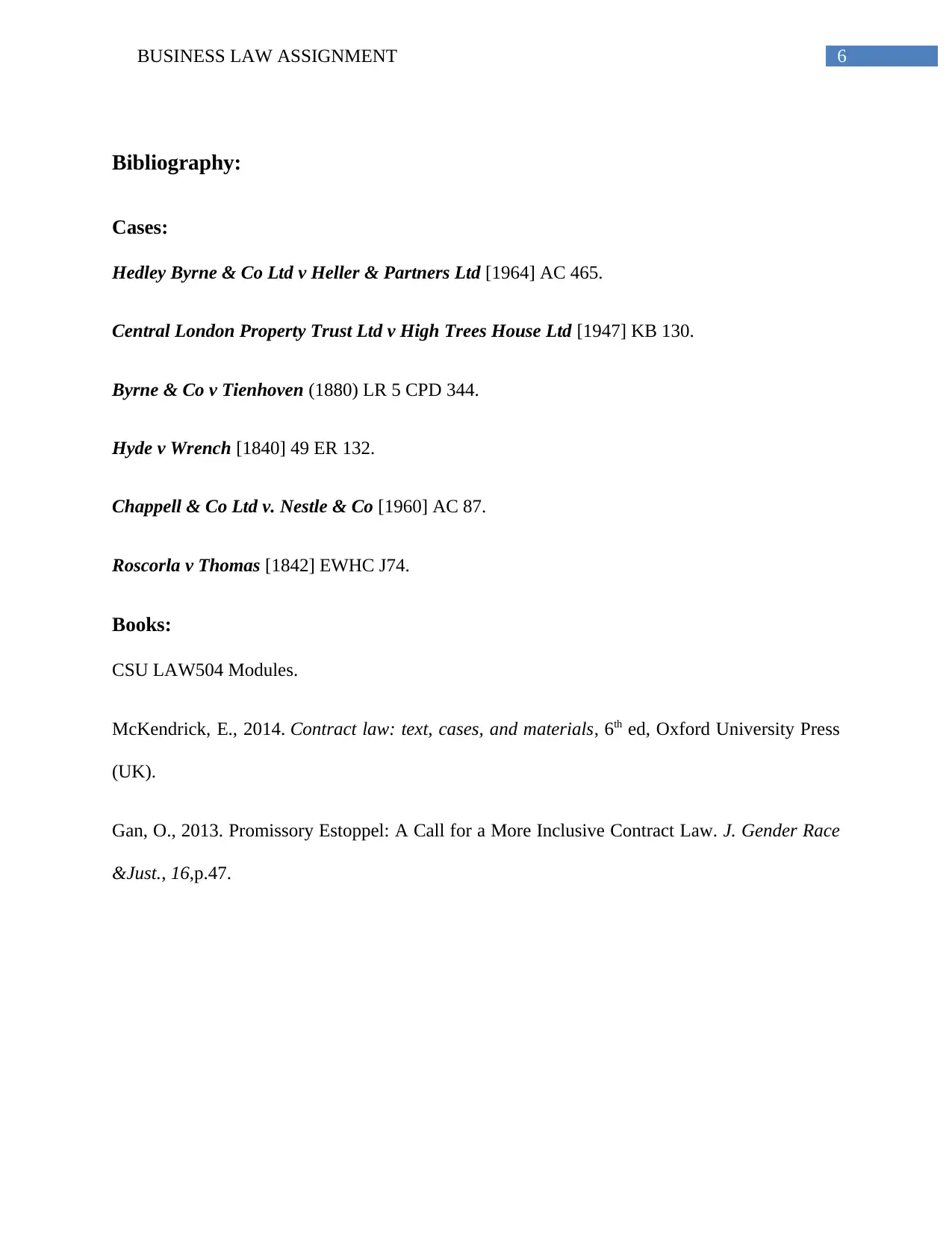
6BUSINESS LAW ASSIGNMENT
Bibliography:
Cases:
Hedley Byrne & Co Ltd v Heller & Partners Ltd [1964] AC 465.
Central London Property Trust Ltd v High Trees House Ltd [1947] KB 130.
Byrne & Co v Tienhoven (1880) LR 5 CPD 344.
Hyde v Wrench [1840] 49 ER 132.
Chappell & Co Ltd v. Nestle & Co [1960] AC 87.
Roscorla v Thomas [1842] EWHC J74.
Books:
CSU LAW504 Modules.
McKendrick, E., 2014. Contract law: text, cases, and materials, 6th ed, Oxford University Press
(UK).
Gan, O., 2013. Promissory Estoppel: A Call for a More Inclusive Contract Law. J. Gender Race
&Just., 16,p.47.
Bibliography:
Cases:
Hedley Byrne & Co Ltd v Heller & Partners Ltd [1964] AC 465.
Central London Property Trust Ltd v High Trees House Ltd [1947] KB 130.
Byrne & Co v Tienhoven (1880) LR 5 CPD 344.
Hyde v Wrench [1840] 49 ER 132.
Chappell & Co Ltd v. Nestle & Co [1960] AC 87.
Roscorla v Thomas [1842] EWHC J74.
Books:
CSU LAW504 Modules.
McKendrick, E., 2014. Contract law: text, cases, and materials, 6th ed, Oxford University Press
(UK).
Gan, O., 2013. Promissory Estoppel: A Call for a More Inclusive Contract Law. J. Gender Race
&Just., 16,p.47.
1 out of 7
Related Documents
Your All-in-One AI-Powered Toolkit for Academic Success.
+13062052269
info@desklib.com
Available 24*7 on WhatsApp / Email
![[object Object]](/_next/static/media/star-bottom.7253800d.svg)
Unlock your academic potential
Copyright © 2020–2026 A2Z Services. All Rights Reserved. Developed and managed by ZUCOL.





